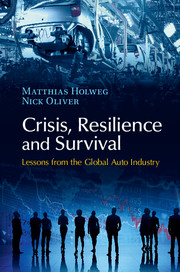Book contents
- Frontmatter
- Dedication
- Contents
- List of figures
- List of tables
- Acknowledgements
- 1 Why a book on corporate resilience?
- 2 The evolution of a global industry
- 3 Competing in a global industry
- 4 Concepts: Stakeholders, operations and context
- 5 Rover: Inside a failing car company
- 6 The failure of Saab Automobile
- 7 Near misses: Chrysler and Nissan
- 8 The future shape of the industry
- Appendix
- Notes
- Bibliography
- Secondary data sources
- Index
4 - Concepts: Stakeholders, operations and context
Published online by Cambridge University Press: 05 December 2015
- Frontmatter
- Dedication
- Contents
- List of figures
- List of tables
- Acknowledgements
- 1 Why a book on corporate resilience?
- 2 The evolution of a global industry
- 3 Competing in a global industry
- 4 Concepts: Stakeholders, operations and context
- 5 Rover: Inside a failing car company
- 6 The failure of Saab Automobile
- 7 Near misses: Chrysler and Nissan
- 8 The future shape of the industry
- Appendix
- Notes
- Bibliography
- Secondary data sources
- Index
Summary
Car companies are huge organizations, which design, make, sell and support complex products in high volumes, all over the world. In order to understand survival and failure amongst auto firms we shall focus on three areas: (1) the relationships between auto firms and their stakeholders (2) the ability of auto firms to run their operations effectively – essentially, designing, making, selling cars to competitive standards – and (3) key features of the context in which auto firms operate. Many analyses of competitiveness in the auto industry have tended to concentrate on the second of these, to the neglect of context and stakeholder relations. Our argument is that to understand survival and failure in the auto industry, consideration all three areas – operations, stakeholder relations and context – is necessary.
Manufacturers operating in competitive market conditions need to be capable of conceiving, designing, making, distributing and selling products to competitive standards, at appropriate prices and in economic quantities. They need to do this while maintaining sufficient margins between revenues and costs so that they can make provision for the development and renewal of products and infrastructure. This is a typical ‘operations’ perspective on success and failure. It is this perspective which dominates much commentary on the auto industry – and, indeed, much of the general strategy and operations management teaching in business schools around the world. From this perspective, efficient companies who make products that are comparable to, or better than those of their competitors in terms of price, quality, style and reliability are successful and grow; those that do not go out of business. To this, one could also add the need for sufficient financial flexibility to ride out perturbations such as economic downturns or other events (e.g. natural disasters, product recalls) to which the auto industry is vulnerable, and which can precipitate crises. The operations perspective represents a powerful, Darwinian logic of survival-of-the-fittest.
This perspective is compelling and persuasive, but it only provides a partial explanation of why some auto companies thrive and survive and others do not. As the woes of some of the Japanese automakers showed in the late 1990s, and the 2008–9 global financial crisis demonstrated more graphically still, auto companies that are capable of designing, making and selling reasonably competitive products, efficiently, can still get into trouble.
- Type
- Chapter
- Information
- Crisis, Resilience and SurvivalLessons from the Global Auto Industry, pp. 73 - 122Publisher: Cambridge University PressPrint publication year: 2015



